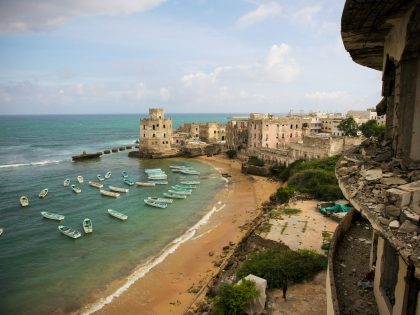The Transformation of K’naan
How a political song about the aftermath of the Cold War, refugees and statelessness was defanged, first for FIFA and then for Coca Cola.

K'Naan on CBC (Screen grab).
At the beginning of February 2009, the Somali singer, K’naan, appeared on Canadian public radio to promote about his new album, “Troubadour.” He was accompanied by his band. K’naan, who is slight, has an unassuming manner and speaks with a soft voice. He was born in Somalia and grew up in Toronto, Canada. When the interviewer asks him to perform a song, K’naan offered to perform an acoustic version of a new song, “Wavin’ Flag” and that he was going to do an acoustic version.
The lyrics are a mix of earnestness and stridency. He sings about war, refugees and militarism, especially in Somalia, the country of his childhood. “Waving Flag,” was no different. The song is from the perspective of a young refugee who recalls the violence they are coming from and their dreams of freedom. The song is anti-war song. In the first verse already, K’naan recalls Somalia’s rich history (“Born to a throne, stronger than Rome”) to its descent into civil war in 1991 (“A violence prone, poor people zone”) and how he, among his friends and cousins made it out of Somalia (“Out of the darkness, I came the farthest / Among the hardest survival”). As The Economist reports last month, “(s)everal of his boyhood friends were shot dead in front of him. He handled a machinegun and exploded a hand-grenade accidentally but says he never killed anyone. His family was intellectual and well-connected.”
We know from interviews that his mother managed to get a 13 year old K’naan and his siblings out of Mogadishu to the US and then Canada. The lyrics capture their wait for a visa: “So we struggling, fighting to eat / And we wondering when we’ll be free / So we patiently wait for that fateful day / It’s not far away, but for now we say.”
The second verse rebukes political leaders, defined as demagogues and deceiving their subjects. In the wake of the US’s global War on Terror, these accusations were quite prescient. The verse ends with on a defiant note recalling a reference about black American soldiers made famous by Bob Marley:
So many wars, settling scores
Bringing us promises, leaving us poor
I heard them say ‘love is the way’
‘Love is the answer,’ that’s what they say
But look how they treat us, make us believers
We fight their battles, then they deceive us
Try to control us, they couldn’t hold us
Cause we just move forward like Buffalo Soldiers
As The Economist quotes him last month: “K’naan thinks the Shabab’s austere version of Islam will fail. The country’s vibrant culture, he insists, will win the day.” An incredible song, with wide appeal, that has an incredible message.
Now comes the news that Coca Cola, one of the main sponsors of the 2010 World Cup in South Africa has chosen “Wavin’ Flag,” as is official song for the tournament. That is different from the song that FIFA picks as its official anthem. Still, this is excellent news. Here’s a test: Will Coca Cola retain the lyrics for Africa’s first World Cup?
Update: The Coca Cola version is out. The lyrics say nothing. It is all about celebration and taking the field to play football. Fair enough, but everything about this World Cup is already all bells and whistles and deception (and annoying plastic horns sounding like annoying bees). Sample from the new Coca Cola version of which there are various remixes: “Give me freedom, give me fire, give me reason, take me higher / See the champions, take the field, unify us, make us feel proud / In the streets our head are liftin’, as we lose our inhibition / Celebration it surrounds us, every nations, all around us.”
And then there’s this from Coca Cola, as Billboard reported during the World Cup:
‘… For its part, Coca-Cola loved the song but noted that lyrical references to “a violent prone, poor people zone” and people “struggling, fighting to eat” didn’t fit the campaign’s themes. “The crucial moment in the discussion came when K’Naan said, ‘I can take that song, refashion some of the lyrics and give you an exclusive version,’ ” Diener says. “That’s an attempt on K’Naan’s part to revitalize the song in the spirit of the World Cup.” …’



